
Company Details
Location
Denver, Colorado
Founded
2004
Ownership Type
Private
Employees
6
Products
Commissary kitchen and co-packing services; bottled sauces and drinks
Denver, Colorado
Founded: 2004
Privately owned
Employees: 6
Industry: Food & Beverage
Products: Commissary kitchen and co-packing services; bottled sauces and drinks
José Esparza, CEO of Denver's original commissary kitchen, is taking a fresh approach to co-packing and workforce development.
In 2004 -- gearing up to launch a catering company -- entrepreneurs Dennis and Elaine McFerrin purchased a commercial kitchen in the Westwood neighborhood in southwest Denver. "At that time, commissaries, or shared kitchens, didn't really exist," explains Esparza.
The McFerrins used a fraction of their space for catering; when other local food manufacturers wanted to lease portions of their kitchen, the husband-wife duo quickly shifted focus from caterers to landlords.

Over the next decade, the McFerrins expanded their commissary into a 12,000-square-foot facility with 11 private kitchens plus a large communal kitchen. Kitchen Network Denver has been supporting specialty food businesses ever since -- approximately 150 of them annually.
In 2010, the McFerrins added an on-site bottling company, Kitchen Network Bottling, specializing in contract packaging for clients such as Fatworks and Tony's Market, which relies on the company for its house-brand pasta sauces.
"One of the unique things about our contract packaging company is that it's USDA-certified," Esparza says. "That's rare in this business." In addition to pasta sauces, Kitchen Network Bottling also manufactures hot and barbecue sauces for dozens of clients from Colorado to California.

The two branches of Kitchen Network Denver are "very different," notes Esparza. "With [the commissary], we are just providing the equipment; for the other, we are facilitating the actual manufacturing of products."
Kitchen Network Bottling does heat packing on-site, attracting food manufacturers interested in producing organic and preservative-free products that won't need artificial ingredients or chemical preservatives to be shelf stable.
For its pasteurization process, Kitchen Network Bottling uses several large-scale kettles. "We also have a pump and filler, and then we hand-cap and -box," says Esparza, adding, "We're a pretty small operation, but our output is large." Up to 300 gallons of product are manufactured daily, which might account for a single client's yearly production needs.

The bottling side of the business is still young, and is just beginning to turn a profit. "We're reinvesting back into the company, looking to scale," Esparza notes.
He joined Kitchen Network Denver last year, in 2016, when his nonprofit economic development organization -- BuCu West -- teamed up with the McFerrins.
At first, Esparza planned to help manage Kitchen Network Denver, but now his nonprofit is in the process of buying both sides of the business, which will remain a for-profit entity. "It is just being run by a nonprofit," Esparza clarifies.

"Denny and Elaine had created a business incubator in a lower-income neighborhood, and we saw it as a great opportunity for an anchor institution that could support economic development all around the neighborhood," Esparza explains. His goal is to eventually turn Kitchen Network Denver into a worker-owned cooperative that serves as an avenue toward ownership for manufacturing employees from the Westwood neighborhood.
For an example of what a worker-owned cooperative looks like, Esparza points to Kitchen Network Bottling's director of operations, Mercedes Covarrubias. "She started out as a cook on the manufacturing side, and now she's overseeing our books and managing our human resources," Esparza says.

Challenges: "We are at a position where the business has fully matured," says Esparza. He and his colleagues want to grow, but negotiating factory space can be a huge obstacle given the high cost of real estate in Denver.
Opportunities: More manufacturing space would bring new opportunity. Right now, for example, Kitchen Network Denver doesn't have space to store the food it makes, which would be valuable to clients. "We are looking to expand in that direction," says Esparza. "We are also looking at adding another shift to our operations."
Needs: "This goes back to storage," Esparza says, reiterating that Kitchen Network Denver would like to bring both cold and dry storage under its roof.

